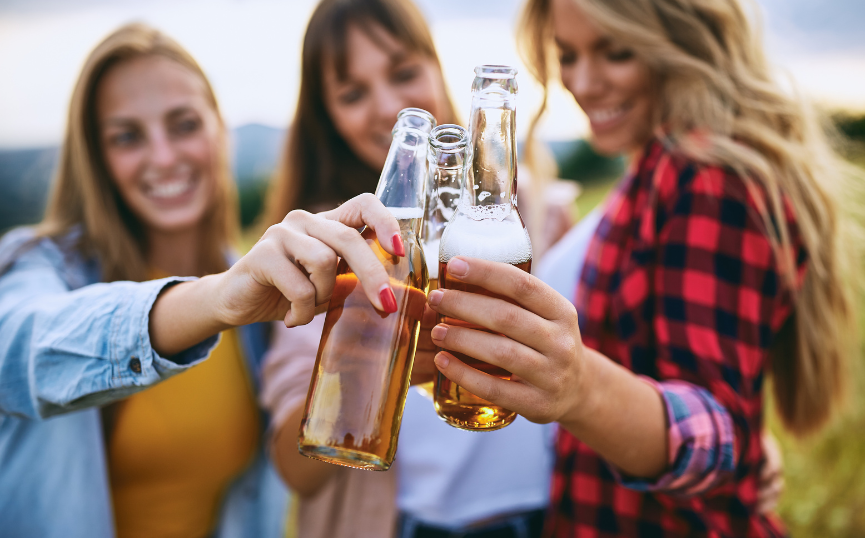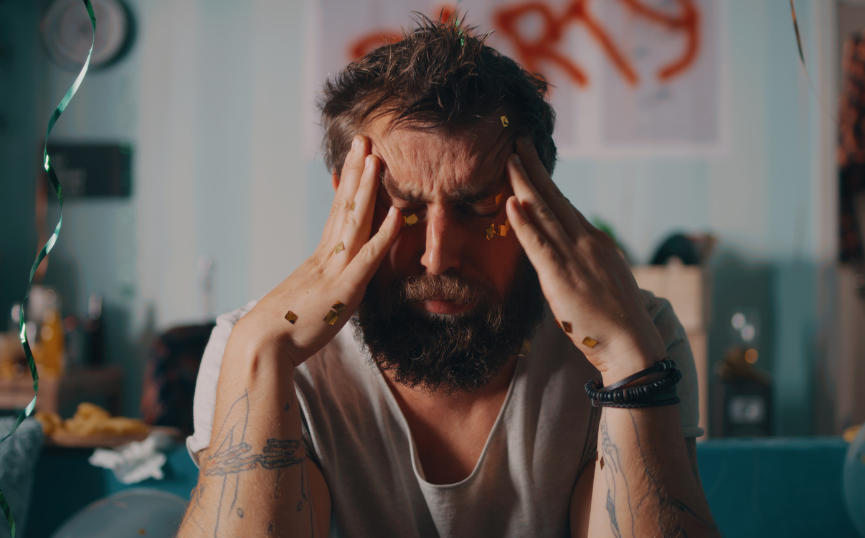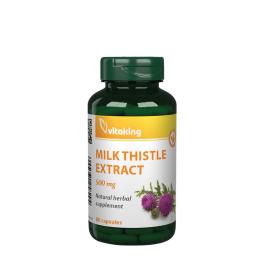Tips and Vitamins for Hangovers – Everything You Didn’t Know About the Morning After
Summer is the season of festivals, garden parties, weddings, BBQs, and casual drinks at the beach. Even the most health-conscious athletes might raise a glass during this time.
At Vitamin360, we’re strong advocates of moderation, though we’ll admit, few of us say no to a good drink now and then.
But what happens when, instead of sunshine and party vibes, you wake up to a pounding headache, intense thirst, and a queasy stomach?

Alcohol’s role as a stress-reliever and social lubricant raises plenty of questions. For instance:
- Can a single night of drinking set back an athlete’s performance?
- Does prioritizing health mean alcohol is completely off-limits?
- How does alcohol relax us, and what are its potential harms?
- What causes a hangover?
- If the damage is done, how can we tackle the dreaded “hangover blues”?
Arm yourself with knowledge about alcohol and hangovers so you’re prepared to make smarter choices next time you “have to” drink! Yes, there are tricks to prevent and ease hangovers!
How does alcohol affect the brain?
Everyone knows alcohol isn’t exactly a health elixir, but do we understand how it works? Let’s start with its effects on the brain, which is why many turn to it for stress relief or a buzz.
The body’s primary calming agent is a hormone called gamma-aminobutyric acid (GABA). Higher GABA levels bring feelings of calm and drowsiness. In a lighthearted sense, GABA is like nature’s “chill pill” produced by your body. Alcohol supercharges this system.1
Our regular readers know that many herbs can activate the GABA pathway, but they do so at a physiological (balanced) level. Alcohol, on the other hand, cranks up the brain’s inhibitory mechanisms full throttle. It also blocks excitatory NMDA receptors, part of the brain’s “go” system.2 So, alcohol slams on the brakes while easing off the gas, leading to intoxication, coordination issues, and slurred speech.
A third effect: alcohol suppresses the frontal lobe,3 the brain region responsible for self-control, decision-making, and social inhibitions (like “don’t shout” or “think before you act”). This results in reduced ability to suppress impulses and reactions. Some people become fun and carefree, while others may turn aggressive, especially if they’re harboring suppressed anger or anxiety.
Why is alcohol harmful?
When something overstimulates the nervous system like this, it’s like sending too much current through a circuit—neurons burn out and die.4
Additionally, alcohol metabolism produces acetaldehyde,5 a highly toxic, cell-damaging compound. Since the liver processes alcohol, it bears the brunt of this damage first.
Alcohol also inhibits the absorption of vitamin B1, potentially leading to B1 deficiency over time.6
Chronic alcohol use activates the brain’s microglia cells (the nervous system’s immune cells), which release inflammatory compounds like cytokines, causing neuron death. This is especially true for areas tied to memory, decision-making, and emotional regulation (e.g., hippocampus, prefrontal cortex).7,8 MRI studies confirm that regular drinking shrinks brain volume, particularly in the prefrontal cortex (decision-making) and hippocampus (memory). The good news? Some of this damage can reverse with complete abstinence.
Another sneaky, short-term harm of alcohol is dehydration. Alcohol suppresses the antidiuretic hormone (ADH),9 which normally tells the kidneys to retain water. By blocking ADH production, alcohol causes the kidneys to release more water, leading to frequent urination, water loss, and electrolyte imbalance.
What happens during dehydration?10
- Brain cells dry out, causing headaches and a “tight” feeling.
- Blood thickens, reducing plasma volume and impairing oxygen and nutrient delivery.
- Muscle cramps and fatigue occur due to electrolyte loss (sodium, potassium, magnesium).
- Dry mouth and eyes signal classic dehydration symptoms.
- Kidneys become overworked from excessive urination.

Does even a little alcohol hurt?
Given these effects, the official answer is yes—but it depends on quantity and frequency. For an athlete, a rare drink during the off-season might be fine. Likewise, health-conscious folks can occasionally enjoy a drink. However, even slightly overdoing it can lead to temporary harm: the infamous hangover (aka alcohol-induced post-intoxication syndrome).
Why do hangovers happen?
Dehydration is the main driver of hangovers, but the full mechanism isn’t entirely clear. Here are the science-backed causes:11
- Electrolyte loss (from dehydration): Sodium, potassium, and magnesium deficiencies can cause nausea and muscle weakness.
- Acetaldehyde: This toxic byproduct of alcohol metabolism triggers nausea, sweating, and headaches.
- Sleep disruption: Alcohol interferes with REM sleep, leaving you exhausted.
- Inflammation: The immune system’s response causes fatigue and irritability.
How can you prevent a hangover?
To quote William Hickey: “…at that moment, I didn’t believe there was a more wretched creature in the world than me.” Sound familiar? Let’s make sure that doesn’t happen after your next night out!
The real MVPs plan ahead. The key?
Hydrate, hydrate, hydrate! Drink a glass of water with every alcoholic drink. Hydrate before and after the party—water, of course. 😊
It’s also critical to avoid drinking on an empty stomach. Eating substantial, fatty foods slows alcohol absorption, preventing it from hitting you too hard, too fast. But don’t overdo it—overeating plus heavy drinking can lead to discomfort during the party.
Next, regularly take a multivitamin to preload your body with antioxidants and B vitamins (especially B1). The GAL GAL+ Multivitamin includes:
- Vitamins C and D, which act as antioxidants to aid detoxification.
- Zinc, which supports alcohol metabolism.
- Taurine, which may reduce next-day headaches.
- Magnesium, which can further ease headaches and muscle cramps.

What to do if the hangover hits?
If water, food, and vitamins don’t save you from the hangover blues, here’s what to do the next day:
1. Drink even more water!
2. Use milk thistle extract, which supports liver function and helps clear toxins. Milk thistle stabilizes liver cell membranes, preventing toxins from entering, and promotes liver cell regeneration.12,13 Its active component, silymarin, is a flavonolignan complex containing silybin, silychristin, and silydianin. Note that milk thistle isn’t a one-dose fix—it works best over time. During heavy drinking or festival weeks, consider a full course. If there’s no significant liver damage, a moderate dose like Now Foods Milk Thistle Extract 150 mg Silymarin is sufficient.
- Start the day with a light breakfast. Try an egg on toast or a banana oatmeal bowl. Avoid greasy or spicy foods that could irritate your stomach. Follow up with chicken broth or ginger tea—the latter can ease nausea.
- Go easy on coffee. Caffeine’s adrenaline effects can act as a natural painkiller, helping with hangover symptoms in small amounts. But too much can worsen dehydration, so sip sparingly!
+1. Activated Charcoal’s Role: Using activated charcoal to prevent hangovers is a common home remedy, but know its limits. It doesn’t absorb well in the body and can bind toxins, bacteria, and drugs in the gut, but it doesn’t effectively bind alcohol. It’s only useful if you drank low-quality alcohol with harmful byproducts. In that case, take JutaVit Activated Charcoal during or right after drinking.
Final word
The best approach is to drink in moderation, but if you’re caught up in the summer party vibe, remember: a hangover isn’t a badge of honor—it’s your body crying for help. A little mindfulness can make those rough mornings much easier to handle.
“Cheers!”
- Davies M. The role of GABAA receptors in mediating the effects of alcohol in the central nervous system. J Psychiatry Neurosci. 2003 Jul;28(4):263-74. PMID: 12921221; PMCID: PMC165791.
- Ron D, Wang J. The NMDA Receptor and Alcohol Addiction. In: Van Dongen AM, editor. Biology of the NMDA Receptor. Boca Raton (FL): CRC Press/Taylor & Francis; 2009. Chapter 4. Available from: https://www.ncbi.nlm.nih.gov/books/NBK5284/
- Oscar-Berman M, Marinković K. Alcohol: effects on neurobehavioral functions and the brain. Neuropsychol Rev. 2007 Sep;17(3):239-57. doi: 10.1007/s11065-007-9038-6. PMID: 17874302; PMCID: PMC4040959.
- Tateno M, Saito T. Biological studies on alcohol-induced neuronal damage. Psychiatry Investig. 2008 Mar;5(1):21-7. doi: 10.4306/pi.2008.5.1.21. Epub 2008 Mar 31. PMID: 20046404; PMCID: PMC2796092.
- Quertemont E, Didone V. Role of acetaldehyde in mediating the pharmacological and behavioral effects of alcohol. Alcohol Res Health. 2006;29(4):258-65. PMID: 17718404; PMCID: PMC6527032.
- Dervaux A, Laqueille X. Le traitement par thiamine (vitamine B1) dans l’alcoolodépendance [Thiamine (vitamin B1) treatment in patients with alcohol dependence]. Presse Med. 2017 Mar;46(2 Pt 1):165-171. French. doi: 10.1016/j.lpm.2016.07.025. Epub 2016 Nov 3. PMID: 27818067.
- Warden AS, Triplett TA, Lyu A, Grantham EK, Azzam MM, DaCosta A, Mason S, Blednov YA, Ehrlich LIR, Mayfield RD, Harris RA. Microglia depletion and alcohol: Transcriptome and behavioral profiles. Addict Biol. 2021 Mar;26(2):e12889. doi: 10.1111/adb.12889. Epub 2020 Mar 16. PMID: 32176824; PMCID: PMC8510547.
- Pahng AR, McGinn MA, Paulsen RI, Edwards S. The Prefrontal Cortex as a Critical Gate of Negative Affect and Motivation in Alcohol Use Disorder. Curr Opin Behav Sci. 2017 Feb;13:139-143. doi: 10.1016/j.cobeha.2016.11.004. PMID: 28111628; PMCID: PMC5242235.
- Harper KM, Knapp DJ, Criswell HE, Breese GR. Vasopressin and alcohol: a multifaceted relationship. Psychopharmacology (Berl). 2018 Dec;235(12):3363-3379. doi: 10.1007/s00213-018-5099-x. Epub 2018 Nov 3. PMID: 30392132; PMCID: PMC6286152.
- Taylor K, Tripathi AK. Adult Dehydration. [Updated 2025 Mar 5]. In: StatPearls [Internet]. Treasure Island (FL): StatPearls Publishing; 2025 Jan-. Available from: https://www.ncbi.nlm.nih.gov/books/NBK555956/
- Swift R, Davidson D. Alcohol hangover: mechanisms and mediators. Alcohol Health Res World. 1998;22(1):54-60. PMID: 15706734; PMCID: PMC6761819.
- Achufusi TGO, Pellegrini MV, Patel RK. Milk Thistle. [Updated 2024 Feb 28]. In: StatPearls [Internet]. Treasure Island (FL): StatPearls Publishing; 2025 Jan-. Available from: https://www.ncbi.nlm.nih.gov/books/NBK541075/
- Mulrow C, Lawrence V, Jacobs B, et al. Milk Thistle: Effects on Liver Disease and Cirrhosis and Clinical Adverse Effects: Summary. 2000. In: AHRQ Evidence Report Summaries. Rockville (MD): Agency for Healthcare Research and Quality (US); 1998-2005. 21. Available from: https://www.ncbi.nlm.nih.gov/books/NBK11896/


![GAL GAL+ Multivitamin [new recipe] (205.9 g) GAL GAL+ Multivitamin [new recipe] (205.9 g)](https://en.vitamin360.com/img/42678/2280035000/264x264,rq75p/gal-plus_multivitamin_hatcimke.webp?time=1745477197)








